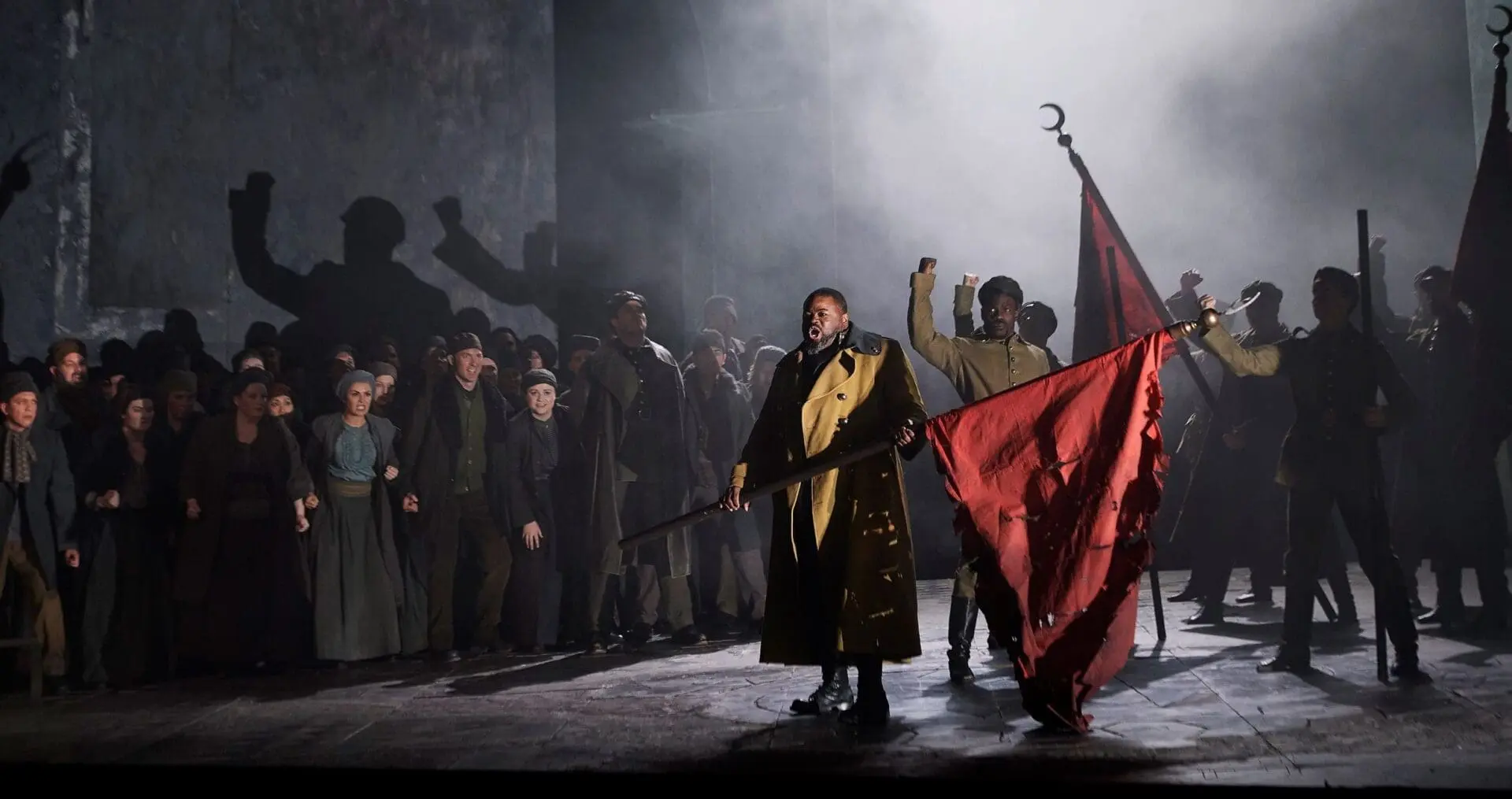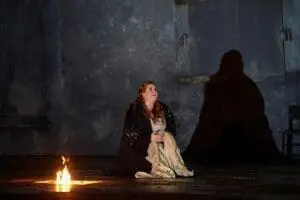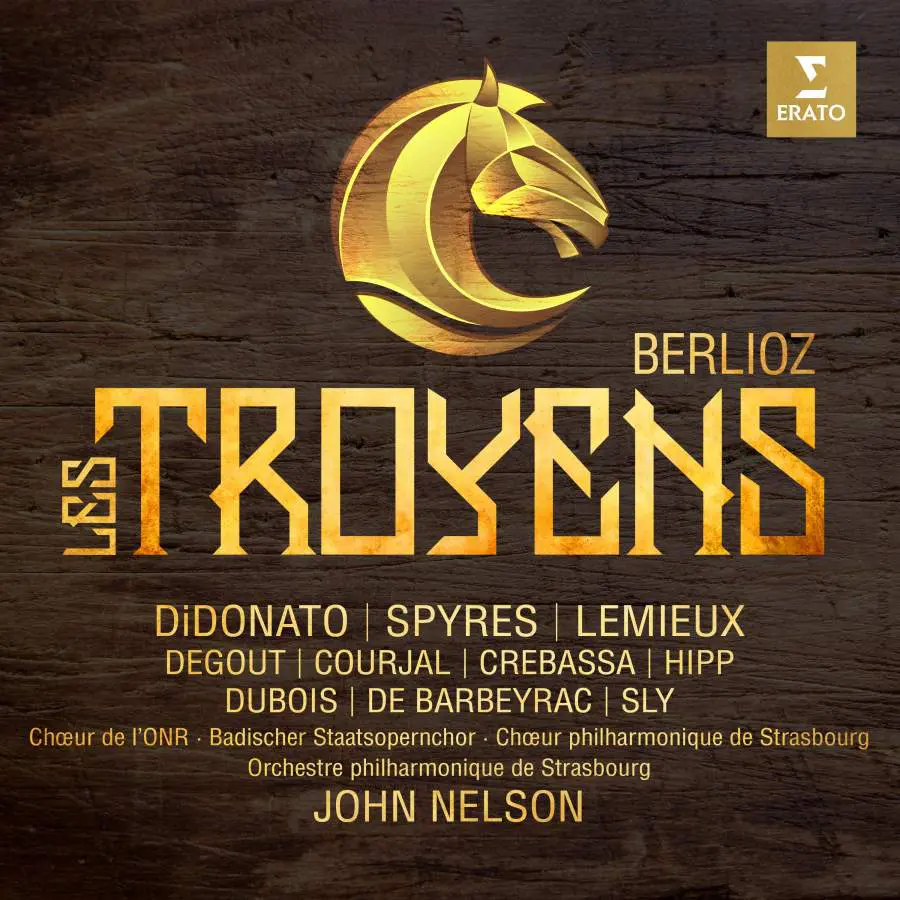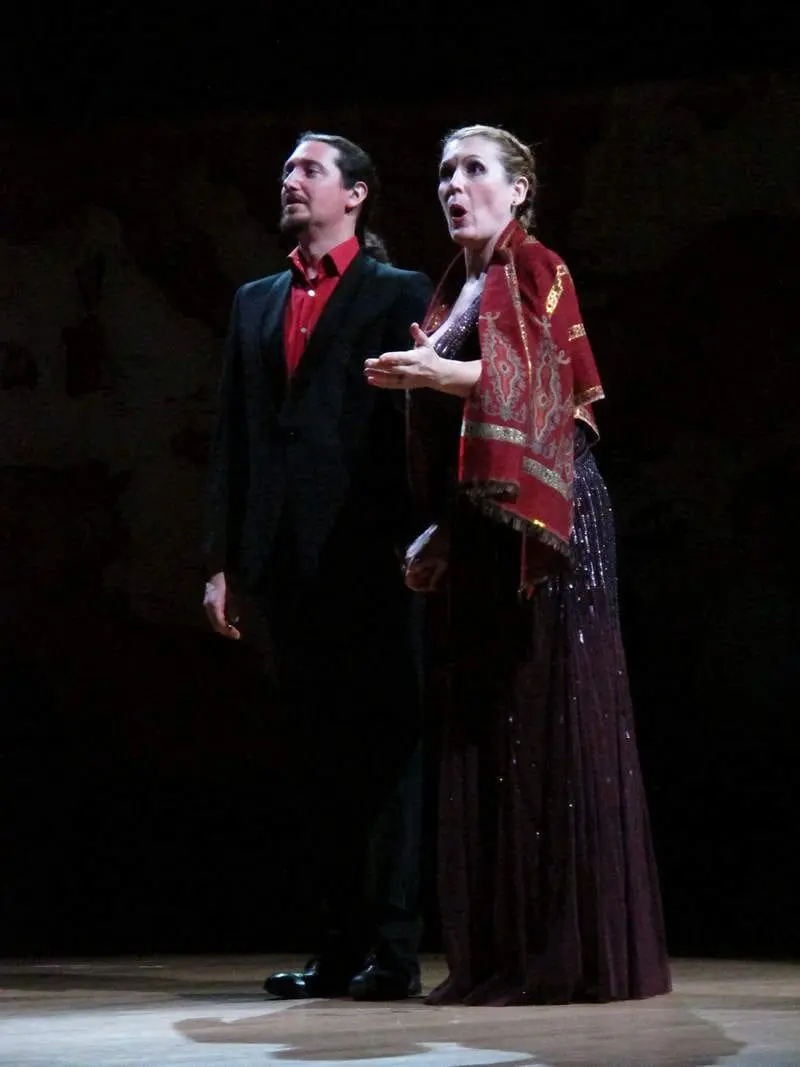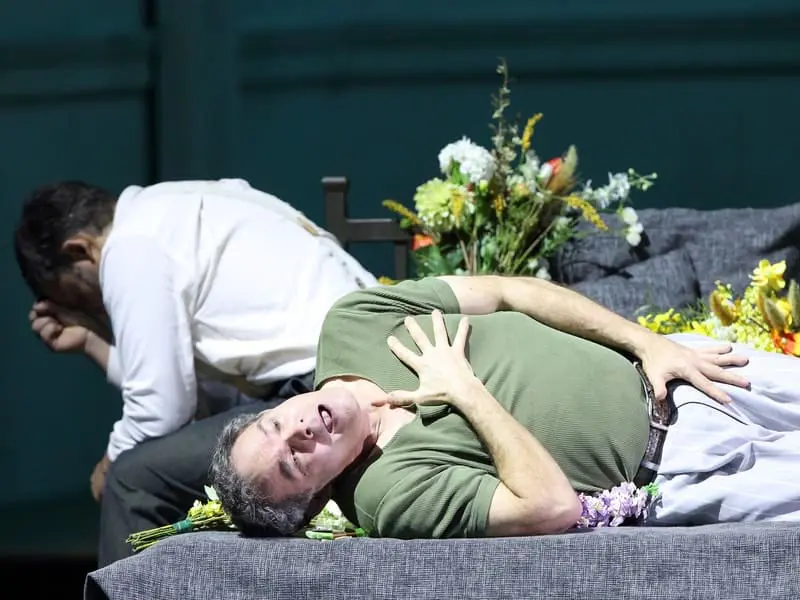Arrigo Boito, the redoubtable 19th-century Italian poet and Verdi’s best known librettist, skillfully distilled and adapted Shakespeare’s Othello for the operatic stage but also, unfortunately for us today, flattened it into a morality play. Gone is Shakespeare’s Act I, in which the Moorish general of the Venetian Republic defends himself and his marriage to Desdemona before the Doge and Venetian grandees. Also gone is the worst of the xenophobia and racial prejudice uttered against Othello. Race still matters in the Boito-Verdi Otello, but the protagonist becomes something of an Everyman figure, torn between the Evil of Iago and Desdemona’s spotless purity of heart. Opera unfolds as a morality play of a soul that gradually gives in.
The Canadian Opera Company’s Otello (seen Apr. 30th), directed by David Alden (in a production created at English National Opera) and conducted by Johannes Debus, certainly does justice to the musical side of the Gesamtkunstwerk. I use the Wagner-associated term on purpose: this is the elder Verdi’s first through-composed work, without the standard detachable pieces of Italian ottocento opera: overture, arias, cabalettas, the tutti finales. Their vestiges are still felt in ensembles for soloists (like Act II’s dramatic quartet for Iago, his wife Emilia, Otello and Desdemona), aria-like monologues and a love duet, alongside the powerful choral writing and Verdian orchestral magic.
“The production itself is surprisingly inert for David Alden”
The production itself is surprisingly inert for David Alden, known to the Toronto audiences for a witty Maometto II and a dark, incest-laced Lucia di Lamermoor. Much of this Otello is grey walls and grey uniforms (set and costume design by Jon Morrell), the action placed somewhere between the late 19th century and WWI. Boito grafts Catholicism onto the story with an “Ave Maria” given to Desdemona, alongside her own Marian purity, though Alden kept the Mary imagery Orthodox—as befits the production’s Cypriot location. Boito also draws Iago as a satanic figure, and this is where the libretto hasn’t aged well.
A key point in the opera is Iago’s “Credo”: an exposition of Iago’s worldview, useful for explaining his motives. At first, it seems Iago wants to destroy the couple’s happiness due to a missed promotion Otello gives to Cassio, but that doesn’t come anywhere close to explaining his insatiable will for destruction. Boito gives him a monologue which, in the wrong hands, could sounds like the self-explanation of a Bond villain. (Gerald Finley in this production is tone-perfect.) The God that created him and everything that exists is vile, and He created everything bad in his image, says Iago. A just man is “a mocking actor”—“all his being is a lie: tear, kiss, glance, sacrifice and honour.” Man is an instrument of evil fate, “from the germ of the cradle / to the worm of the grave.” And after all that mockery? “Death is nothingness / heaven an old wives’ tale.” Iago does not believe in an afterlife and the final judgment, so it must mean that he believes doing evil is what we’re here for.
What salvages the COC’s Otello from turning into a musically upgraded version of Gounod’s drab Faust is its singing actors. This production is, paradoxically, saved by Gerald Finley’s Iago (sorry, Boito). His flawless command of verse, enunciation, meaning, and the musical line is the lifeblood of the opera. This Otello is told by Iago; David Alden cleverly turns the character into a narrator. Iago is seated at the edge of stage while declaiming his “Credo” directly to the audience. He lurks in corners as an observer and at the end of the opera, unfazed by the carnage before him, he smiles toward the audience as he would in the company of an accomplice.
“if you’d like to see one the best Iagos of the current generation…this production is just the ticket”
Russell Thomas is a force to be reckoned with, and will very likely be an excellent Otello in the future. Having a black tenor as Otello finally allows the racial prejudice undercurrent in the plot to be fully aired and dramatically explored. (The tradition of ‘blacking up’ tenors of other racial origins is now, and rightly so, largely abandoned—which has one unfortunate effect of almost eliminating the topic of anti-black prejudice from the story altogether.) Thomas has glorious high notes and fortes and a considerable stage presence. In the lower range however, he’s sometimes overpowered by the orchestra.
There is still much to be done in the acting department. He’s grown remarkably as an actor since his Don José in the COC’s Carmen a few seasons back, and was even more convincing as Pollione in their recent Norma. He was a rather one-mood Otello on Apr 30th.
In two of the crucial scenes with Tamara Wilson’s Desdemona, the love duet “Già nella notte densa” and the murder scene, the two singers were awkward with each
other, appearing reluctant to touch. There was some pretty singing in the love duet but it was weighed down by the unwillingness to take the risk of acting. (The less said about the murder scene, the better.)
Wilson was at her best in her “Willow Song,” where the words were deeply felt. The Cypriots, children and sailors show appreciation of Desdemona in a lush segment with mandolins and guitars in Act II. She has all the music in her favour…and yet…and yet: this was, dramatically, a sketch of a Desdemona with whom it’s hard to empathize. Boito does not help in this endeavour, making her saintly meek and self-sacrificing, and willing to absolve her murderer with one last line even after he’s strangled her.
However—if you’d like to see one of the best Iagos of the current generation in action, this production is just the ticket.


